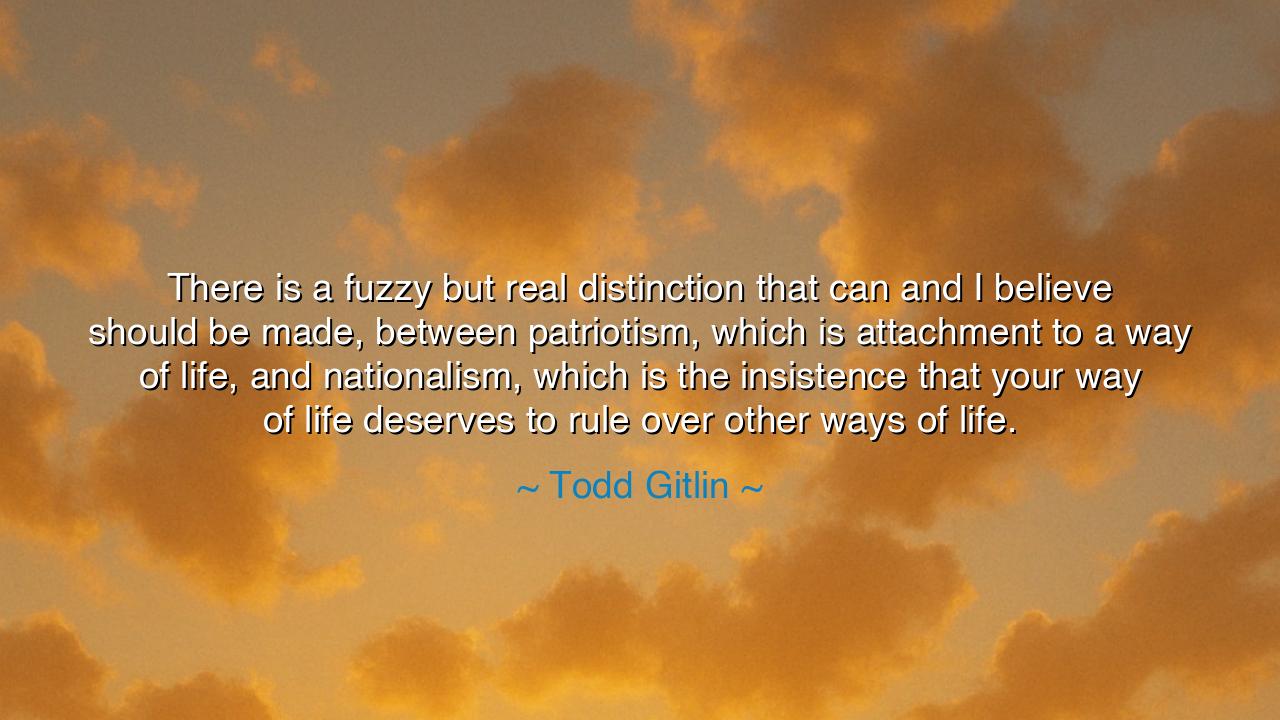
There is a fuzzy but real distinction that can and I believe
There is a fuzzy but real distinction that can and I believe should be made, between patriotism, which is attachment to a way of life, and nationalism, which is the insistence that your way of life deserves to rule over other ways of life.






The words of Todd Gitlin—“There is a fuzzy but real distinction that can and I believe should be made, between patriotism, which is attachment to a way of life, and nationalism, which is the insistence that your way of life deserves to rule over other ways of life.”—echo with the wisdom of one who has looked deeply into the heart of nations. Here he does not reject devotion to the homeland, but seeks to separate the love that nourishes from the pride that devours. Patriotism, he teaches, is rooted in care, in the simple attachment to the traditions, values, and ways of living that give a people identity. Nationalism, however, transforms that love into arrogance, into the belief that one’s way is not only worthy but supreme, to be imposed upon others by force or conquest.
The ancients knew of this distinction, though they did not always live by it. In the Greek city-states, the citizens of Athens loved their democracy, their poets, their navy, and their gods. This was patriotism—attachment to their way of life. Yet when Athens sought to dominate other city-states during the Peloponnesian War, insisting that their democracy gave them the right to rule, it turned into nationalism. In this transformation, Athens lost its balance, and in the end, it lost its freedom too. The lesson was etched into history: love of one’s polis could be noble, but the hunger to dominate others was a path to ruin.
A later example lies in the story of America itself. During World War II, the soldiers who fought did so out of patriotism, defending their way of life against tyranny. They sought not empire, but the preservation of freedom. Yet in the years that followed, as superpower rivalries grew, the danger of nationalism emerged—the temptation to see the American way not only as worthy of love, but as superior, destined to rule the globe. It is this shift that Gitlin warns against: the subtle slide from devotion to domination, from attachment to arrogance.
History also shows the devastation of unchecked nationalism in the 20th century. Nazi Germany is perhaps the clearest example. Love for Germany, its culture, its people, its soil—that was patriotism. But when this love was twisted into the ideology that Germany’s way must conquer all others, it became a raging fire that consumed millions. The line between devotion and domination, though fuzzy, was crossed—and the world paid in blood. This is the danger Gitlin urges us never to forget.
Yet patriotism, rightly understood, is not to be feared. It is the seed of community, the bond that ties farmer to field, family to hearth, citizen to homeland. It inspires sacrifice not for conquest, but for preservation. The mother who teaches her child her people’s songs, the soldier who defends his village from invaders, the citizen who works to better the soil of his country—all of these embody patriotism. It is love without arrogance, devotion without contempt for others.
The lesson for us is clear: we must cultivate patriotism but resist the temptation of nationalism. Love your own way of life, but do not despise another’s. Defend your traditions, but do not demand that others kneel before them. The greatness of a people lies not in their power over others, but in their faithfulness to their own way, combined with humility to respect what lies beyond.
Practical action flows from this wisdom. Celebrate your traditions, your culture, your nation’s ideals. But when you encounter another’s ways, listen and learn before you judge. Resist leaders who demand not only that you love your homeland, but that you believe it superior to all others. Build bridges across borders, for true strength lies not in conquest, but in fellowship. Let your patriotism be a fire that warms, not a blaze that burns.
Thus Gitlin’s words endure as a beacon for the generations: the distinction between patriotism and nationalism may be subtle, but it is real, and upon it rests the fate of nations. Choose attachment, not domination. Choose love, not arrogance. For in this choice lies the path to peace and the preservation of all that makes life worthy of devotion.






AAdministratorAdministrator
Welcome, honored guests. Please leave a comment, we will respond soon